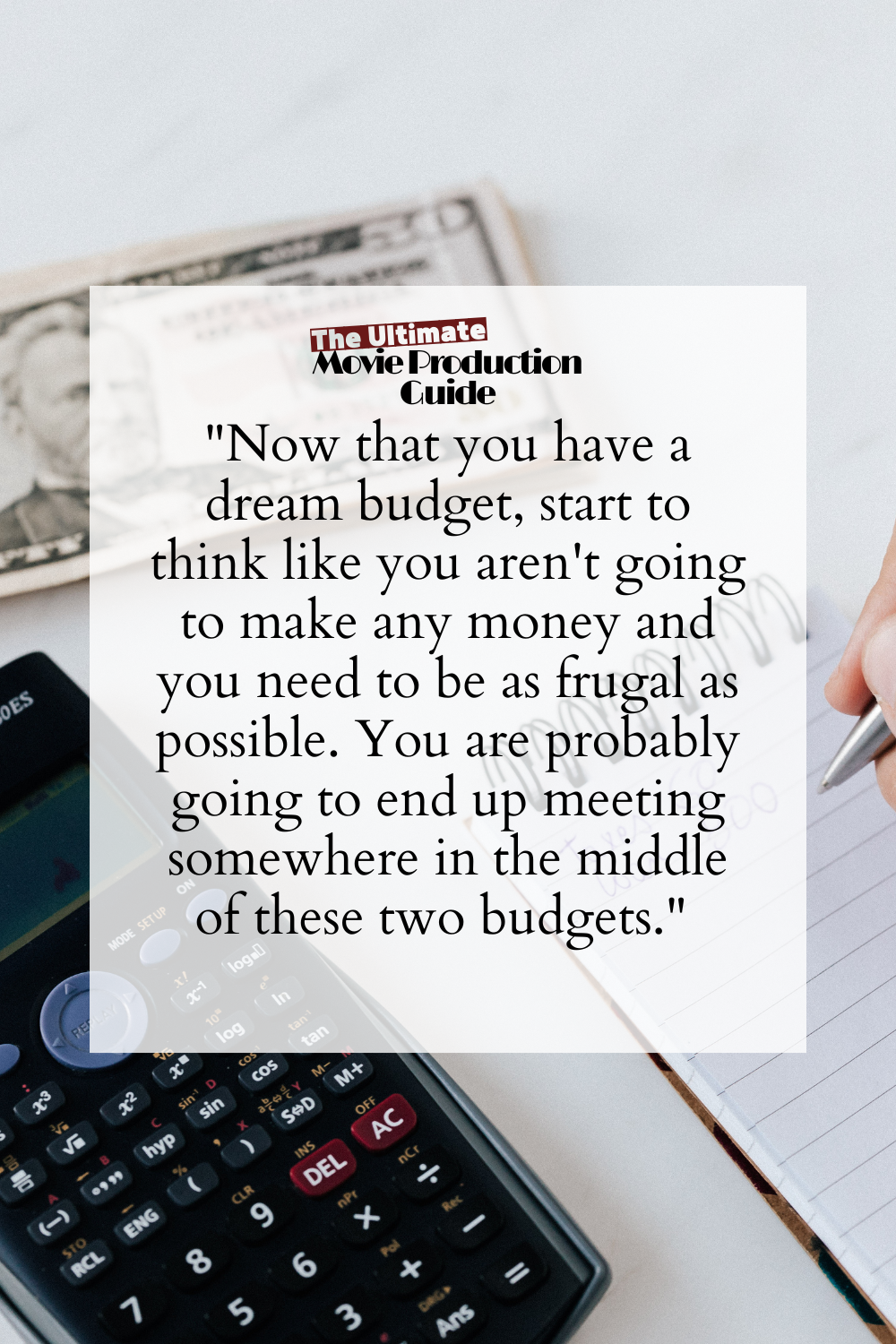Don't miss your chance to invest in 'Fabiola'!
Visit our crowd-funding page for our new production, "Fabiola"!
- Home
- Movie Making Course
- How To Budget For Films You Want To Make
Learn All The Ins And Outs About How To Budget For Films You Are Dying To Make!

Here you are: Phase 4 - How to raise funds and budget for films.
Oftentimes, independent filmmakers think that if they don't have a large budget, they might as well forget the idea of making a movie altogether. If you are of this opinion, let me ease your worries by telling you that this is not exactly the case.
Although Hollywood movies do usually cost an outrageous amount of money to make, yours don’t have to. If you are willing to work hard to make your funds, are careful with how you spend, create a project budget and stick with it, you are sure to come out on top with movies of at least decent quality.
This phase will teach you how to budget for films and get your funds.
Phase 4 has three tasks:
Task 1: Budget For Films
Mary (our director) always builds a budget that has the movie with the best possible items she would ever want for props, sets, equipment, costumes - a dream budget.
Then she makes a separate budget with the same items, but the least expensive version. This makes it easy to compromise with a lower budget than you were expecting.
You are going to be doing something similar in this task.
 Your dream budget may have the Charlemagne sword on the left ($650), but you may need to content yourself with using the sword on the right ($80) depending on funds.
Your dream budget may have the Charlemagne sword on the left ($650), but you may need to content yourself with using the sword on the right ($80) depending on funds.Dream Budget For Films - Start By Sitting Back, Closing Your Eyes And Dreaming...
You know your script. Doubtless you have already seen the entire film in your mind's eye countless times.
If you had all the money in the world to play with, how would your movie look? What kind of costumes are the characters wearing? What sort of props are used? What do the sets look like? You will be amazed at how much inspiration you can find by creating Pinterest boards!
With this image in mind, start window shopping. Go to your favorite sources where you think you can find what you are looking for: Amazon, MuseumReplica, Walmart, the local antique shop, I even visited a strange collectors' store in Colorado that had movie props and costumes.
Wherever you think you can source what you are looking for is where you need to shop. Now, itemize how much you would spend on the entire film using the items that you found at these stores.
This will be your big budget if you get lucky and make a lot of money.
Smaller And More Manageable Budget For Films

Now that you have a list of your dream sets, props and costumes, start to think like you aren't going to make any money and you need to be as frugal as possible. You are probably going to end up meeting somewhere in the middle of these two budgets.
In your second budget, consider only the bare minimum you can get away with using.
- Do you already have a camera that will work for filming, or do you need to buy one?
- Are there costumes in your dress-up box that you can use?
- Do your friends have anything that you could find useful?
- Is there anything around your house that could work prop-wise?
- Does your local thrift store carry things that you can use?
After considering these things, now you need to find the cheapest version of what you want for the film. Itemize everything you absolutely need and make an itemized budget. The total should be less than half if not lower than your dream budget.
Now that you have both these budgets, you can get a good idea of what your final product is probably going to look like. If there is something you absolutely love in your bigger budget, you can totally get it if you have funds to spare after covering your smaller budget.
Just having both these budgets is super helpful in finding middle ground with your funds. Without a budget, you might blow all your funds and then be really tight and need something later.
Don't forget to include any equipment updates or other necessities such as batteries and gaffer's tape in both your budgets.
Budgeting Equipment For Film
The one thing you really do need to invest in is equipment, but you will only need to upgrade every couple of years or so. Watching Jim Morlino’s How to Make a Movie is a great way to get an idea of what all you are going to need.
To begin with, all you need is a microphone and a camera that the microphone is compatible with. You can work on getting better lights in one of your future movies.
As far as editing software goes, all Apple products come with iMovie, which works great for creating low budget films. Start with that and then upgrade when you think you are ready, with your skills and your budget, for a more advanced program.
For our fourth film, Pelayo, we did upgrade to Adobe PremierePro for editing. Up until then, however, we always used iMovie.
FinalDraft is the best script writing software, but anything that can have lines written on it will work.
Task 1 Checklist:
1. Dream of everything you could possibly want, money being no object, and create a budget.
2. Get realistic and think of the bare minimum you could get away with using and make another budget.
Make sure you include equipment and upgrades in your budgets!
Task 2: Fundraising To Fit Your Budget For Films

All right, after Task 1, you may be feeling discouraged when you see how much money you need to raise. Don't worry, and whatever you do, do NOT get discouraged.
There are several ways to raise money for your moviemaking projects. Use a combination of the below suggestions to see how much you can make:
- Carwashes
- Sell concessions
- Get a booth
- Start a website
- Pour some personal money into it
- Crowdsource
- Garage sales
Fundraisers, I would say specifically carwashes, are your best go. However, choosing only one of the above options is probably not the best idea as the more diverse your ways of raising the funds, the better chances of you reaching your monetary goal.
That being said, try to use at least three of these avenues to obtain your income.
1. Washing Cars Can Be Surprisingly Lucrative
Choose your location to be a public place where there will be a lot of traffic, and get out there with your signs. Invite some of your potential cast to wash with you.
On average, we made about $200 at each carwash outside a California Les Schwab store.
One thing to consider if you are doing it outside a business is that you will definitely need to get permission from the manager of the store. If you are excited and straightforward, they usually say yes.
2. Selling Concessions At Auditions Is A Great Way To Fundraise Because People Are Already Interested
If you host auditions, be sure to sell small concessions to raise some money.
Do not be afraid to jack the prices up a little bit. It is a fundraiser, and you are doing it to make money, not because you thought it might be fun.
Don’t be disappointed if your first couple fundraisers are not a huge success, keep trying and remember that some money is better than no money.
3. Get A Booth To Get Your Name Out And Get A Few Sales
If you have something to sell and the cost of a table isn't too outrageous, you can most definitely get a booth at local festivals and celebrations. Where we are located, we have a pretty big 4th of July celebration that lasts for several days and we try to always have a table there.
Christmas is another good time because people are in a shopping and giving mood and tend to spend more on others than they would ever for themselves.
Sometimes people buy. Most of the time they just act interested and keep walking. Some people don't even look over.
The biggest mistake people make when they are running a booth is staying unengaged. At the grocery store, people just want to do their shopping and get home. At a festival, the atmosphere is completely different.
Your potential customers expect to hear about what you are selling and what they will be supporting.
Give them eye-contact and say "Hello". Tell them a little about yourself. My spiel is something like this:
"Good morning. We are young Catholic movie makers and are selling our films here today and some crocheted baskets to support our small moviemaking business."
That's it. Just something simple. Have a short description also in mind of each film if someone asks about a particular one.
Change your pitch according to where you are and who's shopping.
If you are a Catholic and are at a Catholic event, tell your customers that you are a young Catholic moviemaker who is raising money to make wholesome films.
If you are at a more public place and it is likely that most of the people walking by are not Catholic but probably some Protestant denomination, tell them that you are making movies that uphold Christian morals.
If you are in a small town and everyone has a small town spirit, tell them that you are local and their donation or purchase will support a local small business and local art.
If nothing else, you are at least getting your name out there and being seen.
Don't forget to always hand out business cards! There have been many times that I have been asked if there was a place online (more about that in a minute) where our movies are being sold and was able to give a business card with the web address on it.
A lot of times it was people who were interested in the movies but didn't have cash on them.
4. Another Great Way To Raise Funds Is Through A Website
If you honestly state your intentions, are passionate about what you have to offer, and humbly ask for the help you need, chances are people will want to donate to your cause.
For the first film, you really want to push donations. The most successful donation drives are pledge drives.
Choose a smaller goal than the entire budget such as the main roles' costumes, biggest set, new microphone...whatever you need at the moment. Then show a running total on your website and ask for your audience to raise the certain amount in a certain timeframe.
Maybe offer a prop or set piece as an award for the person who donates the most. This makes it fun and encourages people to give more.
Once you have made one movie, you are going to shift your attention on getting people to buy your homemade movies, which you can easily host on a website, instead of straight up asking for donations.
Since you have a product, be sure to offer it.
Don't ever be afraid to sell your movies. There are many Christian people that will appreciate wholesome, homemade movies made by Christian groups.
That being said, be sure to make a movie from a work in the public domain, a historic event, or an original story so that you don’t need to worry about copyright infringement. For more on how to determine whether a story is in the public domain or not, read this section of the screenwriting phase...
People are very generous, but they would rather be purchasing something and getting something out of it than not. Most full-length films cost about $20, don't be afraid to sell them at that price or $19.99 (it looks better).
Selling also is very encouraging as you often get positive feedback as well as funds for your next project.
5. Fund The Movie Yourself With Your Personal Money And Asking People You Know For Donations

If you have another job and want to invest your own personal money into your project, this is another excellent channel.
Having a job is the quickest way to fund a film, especially if you are working the other avenues as well. The only downside is that you will not have as much time (or energy for that matter) to put into your film if you are clocked in for a fixed period of everyday.
In fact, you will most likely have to quit when it's time to film otherwise you will be facing a lot more frustration on shoot days.
You can also ask people you know if they would like to donate to your project. Cast aunts, uncles, and grandparents are usually very generous, too, if you want to ask your cast to also ask their personal friends or relatives to pitch in.
Having a premiere is also a great fundraiser for the next movie. Don't be afraid to sell concessions and tickets. If you are not a non-profit or an LLC, the easiest way to sell this kind of thing is to have a "suggested donation". This makes it so that you aren't actually selling, just accepting free-will offerings.
6. Get Your Audience Involved In Your Projects - How We Successfully Crowdsourced Our Recent Film
Fellow movie maker acquaintances Juliann Spitzmiller and Hank Rogerson successfully raised over $40,000 for their documentary film from their fans. They documented their strategy and have shared it in step-by-step details for anyone who would like to copy their strategy.
They guarantee that if followed, you will see results. If you are interested to learn more about this strategy, they have given permission to share it, so let me know and I will find a way to get it to you.
We used their strategy but in smaller chunks. We ran on our site what we called "rounds." These were in fact the same thing as launches but instead of asking for $13,000 for our project, we would open a round of funding, reach a certain attainable goal, lets say around $3000, then we would celebrate our success and close the round for about 6 weeks.
We noticed that this gave our audience the feeling that we were not always asking for money, only some of the time. We would say that our audience needed a break so we would stop begging for a while and spend time preparing content to promote the next round.
Here is how our rounds looked:
We Raised $2,745 In Round 1 : January - July 2023
We Raised $4,815 In Round 2 : October - November 2023
We Raised $4,016 In Round 3: February - June 2024
$11,576 Total Raised
As you can see, we still need to run one more round to finish funding the project.
Project Proposals
By all means, plan your launches and rounds, but don't forget to have everything in place before you officially launch. This is the pre-launch phase.
One of the first things that we make when we conceive a movie idea is a project proposal which you learned about in Phase 3.
Just reformat a little bit, especially the budget page, saying that this is a story that needs to be a movie, this is how much you would like to raise and this is how much you have raised so far.
Make an ending sheet telling how to donate.
This is a physical document that is filled with information about your ideas and dreams for the project. You will print and hand out hundreds of these during the course of the campaign. This document should be updated every time you close a round, so keep it current.
See our FABIOLA project proposal that has been adjusted for potential contributors.
Do not underestimate the power of these proposals.
Businessmen love them. They don't need to be pretty and glamorous. (Unless you are like me and must spend more time on design than on content.)
How to start conversations with these things? That is the hard part. I've realized that it is not about starting conversations, it's all about ending them.
But it can be as easy as answering the question that everyone asks, "How are you?" When someone asks how you are, you can easily tell them that you are so enthusiastic right now about a film project that you are in the first stages of.
Then they are interested. Everybody loves films. Then they ask, "What is it about?" If you are a filmmaker, you know that you hate this question. You are enthusiastic about this story but you can't answer this question.
That is why you need to practice your elevator pitch.
They don't want to know the story details, they want to know how you intend to impact the world through this film, and this is where potential contributors are willing to put their money. So you give a 30 second answer on what the take away of the film is. Then you say something like, "I have a project proposal with much more information. Would you like me to send you one and you can read all about it?"
They say "yes" of course because it would be rude to say no.
They then are either snail mailed or you drop into their office (even better) with a 5 page document complete with story details, charts, graphs and a final page begging for money. This conversation works for everyone.
Even if you don't expect someone to contribute due to their situation, tell them that the last page is for seeking funds and ask them to share it with someone who may be able to contribute. They may just go to their millionaire friend who is always complaining about Hollywood and tell them to do something about it by contributing to you.
Follow Up
Check in with the potential contributor after a couple weeks and ask them if they had an opportunity to look over the proposal you sent. They usually know why you are calling and they will come right out and say that they are interesting in contributing. Make sure that your enthusiasm over them donating is almost as high as your excitement over the project. Make them feel like they just joined the team and are now an important part of the film.
Don't get super disappointed if someone can't contribute. If you need to force a "no" out of them remain excited about the project and keep them posted. Just because they are not loaded does not mean that they don't deserve an occasional verbal project update now and then. Maybe they will be investors if the opportunity ever opened.
And whatever you do, never feel so disappointed that you give up. Remember that this is something you are passionate about and not everyone is going to feel the same way you do. But this is still your passion and you can't let someone else stamp that fire out.
Make Contributors Feel Special
Now, this is the fun part. After someone has contributed, it's time to put in place all those perks that you planned. Leaving this part a surprise to the contributors leaves you in control of what and when you make them feel special. Ways that I usually give the contributors special treatment include:
- An invite to the first script read though
- Thank you letters in the mail
- T-shirt give away
- Email updates every day during filming
- Thank you pictures from the cast and crew
- Name in credit roll
Some of these things I know made them feel special, some maybe not. You can decide what works best for your project and what maybe won't. They basically want to feel like they are part of the filmmaking industry. Let them know that you couldn't do it without them and together you are reclaiming art.
Don't Stop
When you get even a $100 donation, celebrate like it was $2000. Tell everyone on the team that you got a contribution. Announce it on your campaign page by saying something like: "Someone from TX contributed $100!"
And don't forget to keep your graphs and bars up to date. This keeps momentum going.
Keep up the steam during the launch. Post film related content every day and don't let off the gas until after the campaign. People need to look forward to rounds because that is when you really share what is going on.
Shamelessly ask for money at the end of every social media post.
Count down how much more you need to finish the round.
Celebrate The Milestones
Once you reach your small round goal, tell your fans that you did it! Close the round and lie low on the money thing for a little while. We make it almost impossible to donate on our site during this time. We usually make a short no budget film during the break because that is what our audience really wants from us. This is like a little thank you to everyone for bearing through our begging stages.
7. Gather Items To Sell At A Garage Sale For Extra Funds
Gathering items and asking the cast's families to donate items and selling them at a garage sale is another super great fundraiser. It is a lot of work, but it takes less mental power. You just have a garage sale. Encourage people to bring anything they don't want or need anymore, price it and stick it out.
Make sure you have plenty of signs directing people from the road and pick a good location. You can let shoppers know that it is a fundraiser, but most of them are just there for the garage sale and aren't going to care that much.
Don't forget to have a tip jar out for extra money!
Task 2 Checklist:
Choose three or more of the following methods for raising funds and use them:
1. Carwashes
2. Sell concessions
3. Get a booth
4. Start a website
5. Pour some personal money into it and ask for personal donations
6. Crowdsourcing
7. Garage sales
Task 3. Use Your Past Films To Fundraise For Future Films
I know that I mentioned this before, but it is very important to use films you've already made to fundraise. Sell your movies! I can't stress enough how important this is.
When people are able to see what you are able to do, they are going to be willing to donate to make your films even better. You have to ask for it though. Have slides and videos that carry the context of "Love what you just watched? We are always working on more. Visit our site to see what we are making now." On your site make sure that you ask for donations to create future films.
Host a premiere for every film you make. Premieres are fundraising events. Put a donation jar in a prominent place, refer to it, point it out, tell people where it is. Thank them when they donate!
Don't worry, I'll teach you how to throw an Old Hollywood glamour party when your movie is finished in Phase 16.
Task 3 Checklist:
1. Sell your movies
2. Showcase your movies and ask for donations on your website
3. Host a premiere fundraiser
Well...you made it! In this phase, you have
- Budgeted for your film,
- Fundraised and
- Learned how important selling your films to support future films is going to be for your company.
You are ready to move onto Phase 5:
Is Budgeting For Films Still A Mystery To You?
Did I miss something on this page? Do you have any more questions about your current project budget, our current budget, budgets in general? Please leave it below. I'd be happy to help you with them!
Even if you don't want to ask a question and just want to tell us about what you are up to with your project budget, we would be happy to hear about it and celebrate your accomplishments with you. So, please, don't hesitate to tell us what you are thinking!
